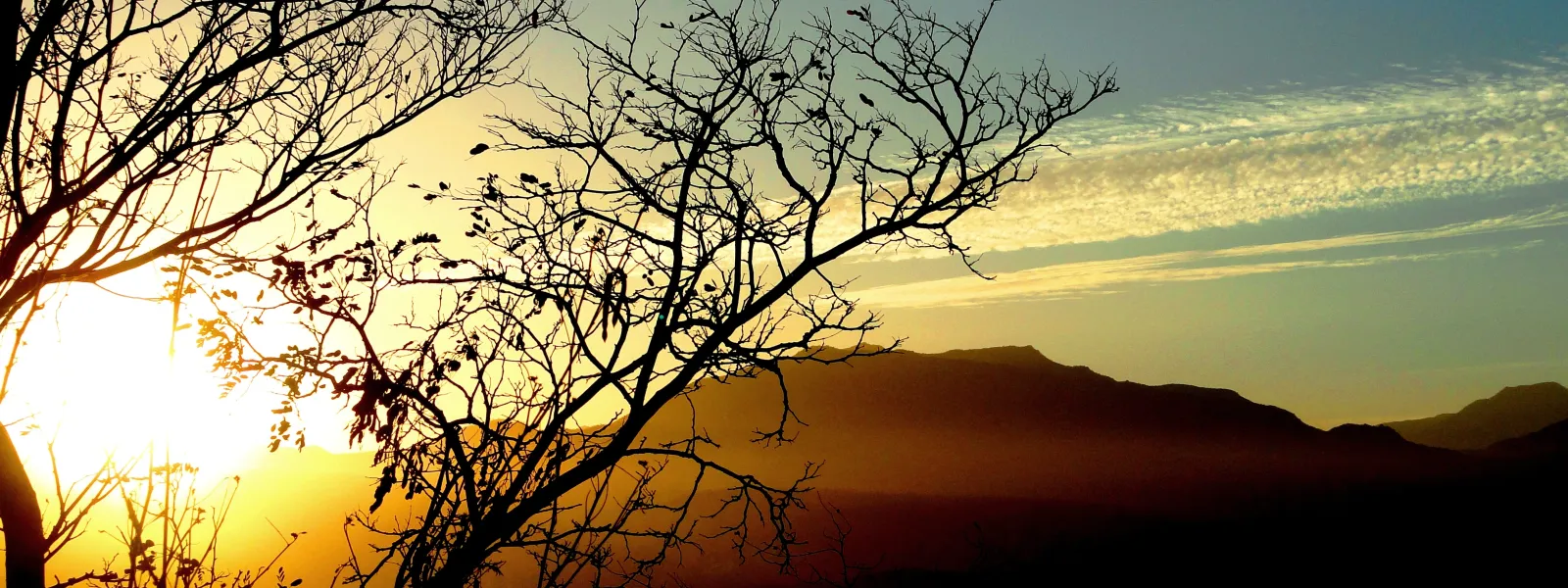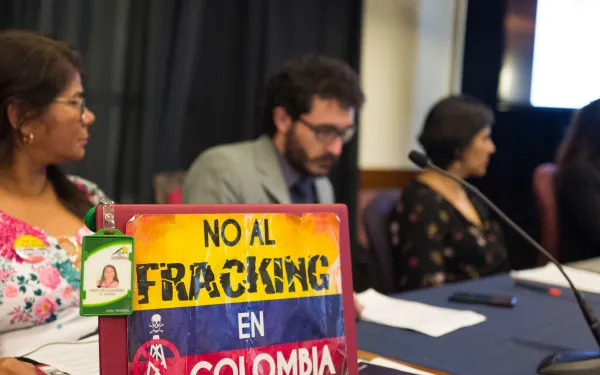
Project
Photo: Ana Rodríguez Carrington (CC BY 2.0)Victory: Biosphere Reserve in Baja California Saved from Toxic Mine
Known as an “ecological treasure house,” the Sierra La Laguna Biosphere Reserve at the southern tip of Baja California will not be spoiled by toxic mine waste, thanks in part to AIDA’s advocacy.
The reserve was once an island, so it’s home to rare plant and animal species. Canyons, swimming holes, and hot springs can be found in its granite mountain range and lowland tropical forests.
Thanks to AIDA and our partners in Mexico, the Mexican government denied an environmental permit for the Paredones Amarillos gold mine, halting the project for the time being. To protect the biosphere reserve, AIDA helped educate community groups and decision makers about the mine's risks. This helped to build the political momentum necessary for the government to deny the permit.
To extract gold from the mountains, the Canadian company Vista Gold proposed to carve out huge quantities of rock—each ton containing a mere gram of gold–-grind it into sludge, and treated it with cyanide. The company planned to dump massive amounts of toxic waste (called “tailings”) behind a dam intended to store it forever. Unfortunately, tailings dams can break for various reasons, as happened at Bolivia’s Porco mine in 1996. When that dam collapsed, more than a quarter million metric tons of tailings flooded the river and contaminated 500 miles (800 km) of waterways in Bolivia, Argentina and Paraguay.
The mine could also cause acid mine drainage. When sulfur-containing rocks are exposed to air and water, sulfuric acid forms, which causes toxic heavy metals to dissolve and drain into the watershed. The risk of acid mine drainage in Sierra La Laguna was significant and the human and environmental cost would have been tremendous: thousands of people and countless wildlife in the reserve rely on its water for survival.
Depleting freshwater is a further threat because mines use tremendous quantities of water. Owing to the scarcity of water in the reserve, Vista Gold proposed to build a plant on the Pacific coast to remove salt from sea water in a highly energy-intensive process, and then pump the water 45 km to the mine site. The desalination plant posed a threat to the endangered leatherback sea turtle.
Singly and together, the mine’s impacts would have devastated a rare jewel, a unique and lush paradise worth saving for future generations.
Related projects

The IPCC climate report: science has spoken and we must act now
The international scientific community has spoken: the only thing that can save us from a climate catastrophe is a radical and immediate change. The next 11 years are the most important in the history of the planet, in terms of climate change. Our response to their message will determine our future. In its most recent analysis, the Intergovernmental Panel on Climate Change (IPCC) of the United Nations establishes the impacts that could occur if the planet’s average temperature increases by more than 2°C, and compares those with what would happen if we stop warming, or at least keep it below 1.5°C. The 2016 Paris Agreement, an international accord to curb climate change, aims to keep warming well below 2°C with respect to pre-industrial levels, and to continue global efforts to limit it to 1.5°C. The impacts of global warming The IPCC experts’ conclusions are piercing. Those extra 0.5°C would be lethal for millions of people and their ways of life. If the Earth warms 2°C or more, we would experience: more frequent and intense heat waves, droughts and floods; sea level rise of an extra 10 centimeters, implying coastal flooding and filtration of salt water into agricultural areas and freshwater sources—a matter of life and death for roughly 10 million people; double the risk of habitat loss for plants and vertebrates, and triple the risk for insects, considering more than 100 thousand species which were studied; the disappearance of more than 99% of coral reefs, while 10 to 30 percent of what remains could be saved if we were to stabilize the planet’s temperature below 1.5°C; an increase in the range of mosquitoes that transmit diseases such as malaria and dengue; and the devastation of crops and livestock, severely affecting global food security. So, how are we doing now? Not so well. The planet has already warmed 1°C since preindustrial times, and in 2017 the emissions responsible for warming increased again. The commitments nations made to comply with the Paris Agreement are insufficient. Settling on that level of ambition would take us to 3°C warming by 2030, a reality with unimaginable consequences. Changing our climate destiny Let’s talk about solutions. Ensuring that the planet’s warming doesn’t exceed 1.5°C is possible, but it will require unprecedented action. Emissions must lower by 45 percent between 2010 and 2030, and we must achieve carbon neutrality by 2050. That means not emitting more than what the world’s forests and natural carbon sinks can absorb. This will require that: the most polluting industries, particularly those producing fossil fuels, implement radical changes; renewable energy is the norm by 2050, accounting for between 70 and 85 percent of total energy production; coal-fired power plants disappear; transportation runs with clean, renewable electricity; and we expand, maintain, and care for forests and other natural carbon sinks, which are responsible for removing emissions from the atmosphere. The IPCC report also recognizes a monumental opportunity: the mitigation of short-lived climate pollutants (SLCPs)—including black carbon or soot, methane, hydrofluorocarbons and tropospheric ozone. More climatically intense than carbon dioxide, SLCPs are responsible for half of global warming. Because of their short duration in the atmosphere, they could play a key role in reducing warming in the short term. In addition, the reduction of SLCPs brings important benefits for human well-being, including the reduction of pollution that affects public health and better yield of crops. But few countries have included the reduction of short-lived climate pollutants in their national commitments on climate change. At AIDA we’re working so that Latin American nations advance in the control of these emissions. As the region with the greatest potential for renewable energies, Latin America has the opportunity to be an example for the rest of the planet. The threats facing the region are great and avoiding them is well worth the effort. Climate change threatens to shake us from our very roots—melting Andean glaciers, increasing droughts and floods, diminishing freshwater supplies, driving species to extinction, increasing wildfires, favoring the spread of invasive species, losing corals and marine biodiversity, affecting food security, and wreaking havoc on people’s health and livelihoods. The outlook is clear: maintaining global warming below 1.5°C is not an easy task, but science holds it’s possible. We have the scientific knowledge, and the technological and financial capacity to achieve this goal. The responsibility now lies with governments, decision-makers and the private sector—together they must drive unprecedented changes. We must remember that implementing these changes is not just possible, it’s desirable. A world with fewer emissions is a cleaner and a fairer world for us and for future generations. What’s not to like?
Read more
Organizations request Mexico list parrotfish as protected species
Parrotfish are vital to the health of coral reefs, and the Mexican State has an obligation to protect them. In a letter to the government, AIDA outlined the international obligations Mexico has to preserve its coral reefs, requesting that ten species of parrotfish be included in the nation’s list of protected species—a proposal spearheaded by the Healthy Reefs Initiative. Mexico City. Using arguments based in international law and knowledge of environmental treaties, the Interamerican Association for Environmental Defense (AIDA) requested that the Mexican government include ten species of parrotfish in the national registry of protected species, under Official Mexican Law 059, which is currently being updated. AIDA made the request through a letter to the National Advisory Committee for the Normalization of the Environment and Natural Resources, in support of a proposal the Healthy Reefs for Healthy People Initiative made in September in coordination with Casa Wayuu, the Kanan Kay Alliance and the Mexican Center for Environmental Law (CEMDA). “The species of parrotfish we are trying to protect play a vital role in the survival of coral reefs because they feed on algae which otherwise deprive the coral of light and oxygen,” said AIDA attorney Camilo Thomson. “Populations of these fish have declined drastically due to habitat degradation, pollution and climate change. Studies done by the Health Reefs Initiative, among others, have shown that 60 percent of the coral reefs in the Mexican Caribbean are in either poor or critical condition.” The organizations are calling for the following species to be listed under some category of risk in Official Mexican Law 059: the stoplight parrotfish (Sparisoma viride), the rainbow parrotfish (Scarus guacamaia), the blue parrotfish (Scarus coeruleus), the midnight parrotfish (Scarus coelestinus), the queen parrotfish (Scarus vetula), the princess parrotfish (Scarus taeniopterus), the striped parrotfish (Scarus iseri), the redband parrotfish (Sparisoma aurofrenatum), the redtail parrotfish (Sparisoma rubipinne), and the yellowtail parrotfish (Sparisoma chrysopterum). The letter outlines the treaties and conventions that oblige the Mexican State to adequately fight threats to species requiring special protection—species like herbivorous fish, which are vital for the health of Caribbean reefs and other marine ecosystems. These agreements include the Convention for the Protection and Development of the Marine Environment in the Wider Caribbean Region (also known as the Cartagena Convention), the United Nations Convention on the Law of the Sea, the Convention on Biological Diversity, the Ramsar Convention, the Convention concerning the Protection of World Cultural and Natural Heritage, the Tulum Declaration, and the International Coral Reef Initiative. “The letter also mentions the Advisory Opinion on human rights and the environment issued by the Inter-American Court of Human Rights,” Thomson added. “In that decision, the Court strengthens States’ obligations to protect human rights and acknowledges the close relationship that has with environmental protection.” Despite serving as fish hatcheries and natural barriers against hurricanes—among other key functions—coral reefs are very fragile and vulnerable to climate change, the consequences of which include ocean acidification, sea level rise and algal blooms. The latter are caused by untreated or inadequately treated wastewater being pumped into the Caribbean, and other forms of marine pollution. “The most recent report from the Intergovernmental Panel on Climate Change (IPCC) warned that the warming of the planet’s average temperature by more than 1.5 degrees Celsius would result in the destruction of reefs,” explained Melina Soto, Mexico coordinator for the Healthy Reefs Initiative. “It is therefore urgent States adopt adequate measures to preserve coral reefs, and one way to do that is through the protection of herbivorous fish.” Find more information about the case here. PRESS CONTACTS: Victor Quintanilla (Mexico City), AIDA, [email protected], +521 5570522107 Marisol Rueda Flores (Playa del Carmen), Healthy Reefs for Healthy People, [email protected],+521 9848770815
Read more
Civil society warns Inter-American Commission of human rights violations caused by fracking in Latin America
Boulder, Colorado. Representatives of communities and organizations from across Latin America testified before the Inter-American Commission on Human Rights this week on the impacts that hydraulic fracturing (fracking) has on human rights and the environment. The hearing—responding to a petition signed by more than 126 organizations from 11 countries of the Americas—was held in Boulder, Colorado this week as part of the Commission’s 169th period of sessions. The principal requests to the Commission, and the Rapporteurs from various countries, were to urge the States to adopt efficient and opportune measures to prevent human rights violations resulting from the exploration and exploitation of hydrocarbons, and to apply the precautionary principal in the face of fracking’s environmental damages. “In Latin America, fracking been carried out without informing or adequately consulting the affected populations, thereby violating their right to information, participation, prior consultation and consent,” explained Liliana Ávila, Senior Attorney with the Interamerican Association for Environmental Defense (AIDA). “Fracking’s demand for water competes with the use of water for human consumption, and the contamination it causes in the water, soil and air seriously impacts the right to a healthy environment and compromises the effective enjoyment of other rights—including a dignified life, personal integrity, health, food, water and adequate housing.” At the hearing, it was emphasized that women disproportionately suffer the impacts of fracking due to potential harm to their reproductive health, and since women are traditionally responsible for collecting water for use in their homes. Referring to the experience of the Mapuche communities of Argentina, Santiago Cané of the Environment and Natural Resources Foundation (FARN) stressed, “Fracking produces acts of violence against those who defend the environment and their rights.” “Institutionally, we can talk about the criminalization of social protest as one form of intimidation to eliminate the resistance to fracking projects,” he explained. “The prosecution of criminal cases against communities leaders that oppose the development of fracking has become an institutional media campaign that seeks to promote the idea that Mapuche communities are part of a terrorist group.” In Mexico, “specifically in the municipality of Papantla, Veracruz—which according to freedom of information requests is the city with the greatest number of fracking pools in the country—where the population is primarily the Totonac people, this exploitation technique has led to the diversion of springs and the drying up of artisanal wells. Many communities have lost their natural sources of water and have seen their health compromised and their living conditions deteriorate,” explained Alejandra Jiménez of the Mexican Alliance Against Fracking. Dorys Gutiérrez, of the Colombian organization Corporation for the Defense of Water, Territory and Ecosystems, noted that: “In Europe, 18 nations have applied the precautionary principle to prohibit or restrict this practice and in Australia, four of the eight territories have bans or moratoria in place. If fracking is so beneficial, why has it been so widely rejected in so many places?” According to data compiled by the Latin American Alliance on Fracking, roughly 5,000 fracking wells exist across the region. About 2,000 of those wells are found in Argentina; more than 3,350 are found in Mexico; and in Chile, according to official data, 182 wells have been approved, primarily for the island of Tierra del Fuego. Despite the technique’s expansion across the region, there has also been progress in banning or imposing restrictions on fracking in three states of the United States, in Uruguay, in the Argentine province of Entre Ríos, and in more than 300 municipalities in Brazil. Fracking’s advance is harmful to human rights, and represents a threat to the consolidation of the legal framework promoted by the Inter-American Human Rights System, which includes the obligations of States and the international protection of human rights and the environment. PRESS CONTACTS: Victor Quintanilla (MExico), AIDA, [email protected], +521 5570522107 Arturo Contreras (in Boulder, Colorado), +521 5533320505
Read more